From Trees to Honey: The Journey of Bees
Artificial Christmas trees have become a popular staple in holiday decorations, but have you ever thought about the role of bees in their creation? It turns out that honey and worker bees contribute to the festive season’s decorations.
The process starts with harvesting natural tree resin, which can be found in coniferous trees like pine, spruce, and fir trees. This resin contains a sticky, sweet substance that will be used to make the artificial trees’ branches and needles.
Enter the worker bees. These bees are responsible for collecting nectar from flowers. After processing, it becomes honey that serves as the bees’ primary food source. However, bees also collect resin from trees and mix it with wax, pollen, and honey to create a potent substance known as propolis.
Propolis is a natural adhesive bees use to seal their hives, protect themselves from predators, and maintain their hive’s temperature. It also has antimicrobial properties, making it an excellent choice for artificial tree-making since it can inhibit bacteria and mold growth.
The Queen Bee and the Holiday Tree
The role of bees in artificial Christmas trees doesn’t stop with the worker bees.
The queen bee also plays a crucial role in ensuring the trees’ creation, albeit indirectly. Farmers who depend on honey to sustain their livelihoods need healthy bee colonies to pollinate their crops and produce honey.
Bees would protect trees’ natural habitat, and farmers would struggle to grow enough crops to feed the world’s population. Promoting healthy bee colonies, supporting beekeeping, and producing artificial trees can, in a small way, contribute to a sustainable future.
So, the next time you admire an artificial Christmas tree in your home or workplace, consider the bees and their vital role in the festive season.
In conclusion, creating artificial Christmas trees is a complex process involving resin harvesting and the active participation of worker bees and the queen bee. Beekeeping plays a crucial role in maintaining healthy colonies and ensuring the sustainability of our planet’s natural resources. By supporting local beekeepers and choosing high-quality artificial Christmas trees, we can help protect the bees and enjoy the sweet rewards of honey throughout the festive season and beyond.

